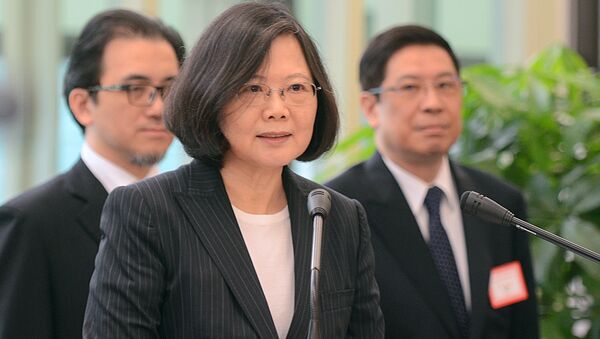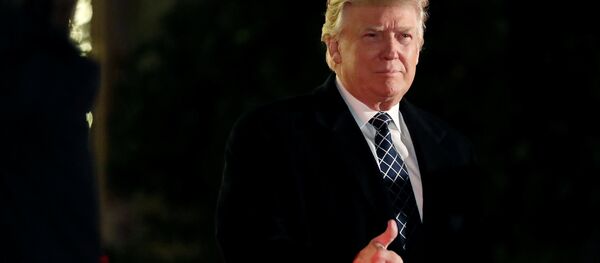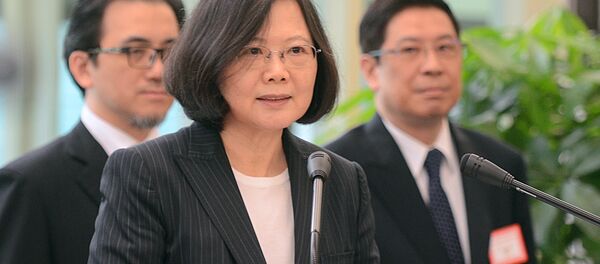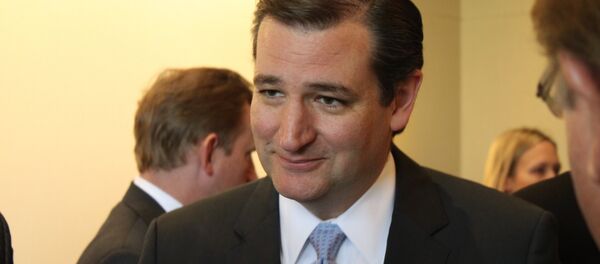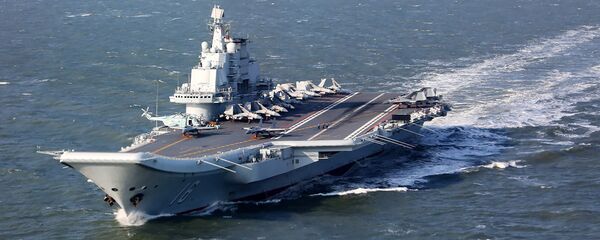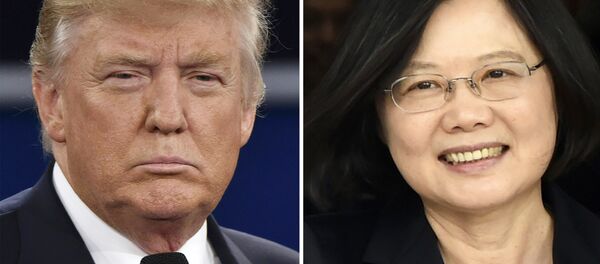MOSCOW (Sputnik) — In case the United States continues drifting toward more engagement with Taiwan, the self-ruled island regarded in Beijing as its "inseparable province," the cross-strait relations risk becoming even tenser.
STARTING POINT OF ESCALATION
January 16 last year was a bad day for China — the candidate from Taiwan’s pro-independence Democratic Progressive Party Tsai won a landslide victory in the presidential elections, bringing to an end the eight-year rule of Beijing-friendly Ma Ying- jeou from the Kuomindang party.
Since 1949, when the Kuomindang forces were moved to Taiwan after being defeated by Mao Zedong’s communists, Beijing has regarded the island as its breakaway province. In 1992, both sides of Taiwan strait reached a cornerstone consensus that there is only one China, though with tricky different interpretations, that allowed both Beijing and Taipei to agree that Taiwan belongs to China, while disagreeing on which one is China’s legitimate governing body. However, this consensus presupposed that Taiwan would not seek formal independence.
Upon being inaugurated on May 20 last year, Tsai failed to officially endorse the 1992 consensus, causing Beijing's outrage. Already in June 2016, Beijing cut off the diplomatic contact with Taiwan, citing president Tsai’s refusal to endorse the concept of a single Chinese nation.
“Tsai's win did not come as a surprise and Beijing had enough time to prepare for it…. Thus, in my view, much of the outrage that Beijing expresses is manufactured in order to generate pressure on Taiwan, i.e. it is not that Taiwanese actions are overly provocative, or provocative at all, rather Beijing hopes that signaling tensions will ‘scare’ Taiwanese (possibly pressured by Americans) into giving in Beijing's demands especially regarding acquiescence to Beijing's understanding of ‘One China’," Michal Thim, an expert on Taiwan at the Prague-based Association for International Affairs, told Sputnik.
REVENGE BY TOURIST CUTS
However, the Czech expert stressed that China-originated tourism had a quite marginal benefit for Taiwan's economy with 2016 numbers suggesting that drop in Chinese tourists has been compensated by an increase in tourism from other countries. In 2016, Taiwan's foreign visitors arrivals totaled 10 million, almost the same number as in the previous year.
“Moreover, Chinese tourists have a rather unflattering reputation and much Taiwanese (except business that opted to rely exclusively on Chinese tourism) will welcome further cuts with cheer,” Thim claimed.
The expert’s view correlates with the Taiwan Thinktank’s October poll outcome. The institution polled the Taiwanese people on Chinese tourism and found out that 85 percent of them wanted to increase the inflow of tourists from other countries, while just 6 percent wanted more tourists from China.
Last year, residents of the picturesque town of Sizihwan in Taiwan's south organized a protest threatening to seal themselves off after being overwhelmed by some 4,000 mainland tourists a day. In mid-summer, when numbers of China's tourists just started to decrease, Taiwanese Internet users launched an online parody advertisements campaign celebrating the drop in numbers of Chinese visitors with slogans like "Without Chinese tourists, it’s now possible to relax in the most popular destinations” or "No more trouble caused by Chinese tourists; a carefree journey begins here."
FIGHT FOR DIPLOMATIC RECOGNITION
Since 1971, when the United Nations recognized the People's Republic of China as "the only legitimate representative of China to the UN", most countries switched their diplomatic recognition from Taiwan, officially called The Republic of China, to the People’s Republic of China, however maintaining unofficial relations with Taiwan through their de-facto diplomatic representations under the banners of trade or cultural offices.
Currently, just 21 countries in the world, mostly in the Caribbean, Oceania and Central America, but also Vatican, maintain full diplomatic relations with the island, being mostly fared by Taiwan’s generous development aid allocated to them in exchange for recognition. While during the previous Taiwanese leader's tenure the longstanding diplomatic competition between the mainland and China, often referred to as “checkbook diplomacy,” cooled down, upon Tsai coming to power, Beijing redoubled its efforts on poaching the island’s diplomatic allies.
On the eve of Tsai's trip to Nicaragua, Hong Kong media reported that Nicaragua could become the next country to switch recognition in favor of China as it had already done in 1985 under Daniel Ortega. Taiwanese officials reportedly had difficulties in talks with their Nicaraguan counterparts in organizing Tsai's meetings while Ortega, again in power since 2006, was the only one among the leaders of four host countries who wanted to avoid a personal meeting with the Taiwanese leader. But on Monday, much to surprise and relief of Taipei, he held a meeting with Tsai shortly after she arrived in Managua.
"The Chinese government could increase pressure on Taiwan by inducing some of Taipei’s diplomatic partners to sever their diplomatic relations with Taiwan and establish formal ties with China, as Sao Tome did recently. Moreover, China could also take measures in the economic sphere, such as limiting Chinese tourist visits to Taiwan," Frans Paul van der Putten, senior research fellow and an expert on China within the Netherlands Institute of International relations Clingendael, told Sputnik, when asked what measures China could undertake to pressure Taiwan over exceedingly pro-independent moves.
Thim, for his part, agreed that in the nearest future Beijing would stick to measures like blocking Taiwan's international participation and cutting tourist groups and possible poaching of another of existing diplomatic allies of Taiwan, but suggested that the latter two measures would have little impact.
“’Stealing' diplomatic allies may generate very short shocking effect but many Taiwanese consider (even if unfairly) ‘diplomatic allies’ as a waste of financial resources,” he said.
CHINA'S DRILLS
The Czech expert also suggested that China would probably conduct more military exercises with clear Taiwan-related purpose, such as amphibious landing drills and naval drills near Taipei-controlled offshore islands, while trying to give these exercises as much publicity as possible.
“Theoretically Beijing could increase pressure on Taiwan's holding in South China Sea, it could also incite riots on the offshore islands near China's coast, like the islands of Jinmen and Mazu, where the population harbors more Beijing-friendly views than on Taiwan's main island. But these are measures that if undertaken, would cause great alarm across the region and Beijing could hardly pretend it is Taiwan and not China that creates troubles,” the expert said.
The Chinese sources did not elaborate concrete economic measures being considered to take down on Taiwan, but any restriction could prove harmful. Taiwan’s exporters heavily rely on the mainland Chinese market and, according to Taiwan's bureau of foreign trade, mainland is Taipei's largest trading partner, accounting for almost 30 percent of the island's total trade volume. While in the beginning of 2016 Taiwan was hoping to join the US-championed Trans-Pacific Partnership agreement to benefit from access to the US markets, now these aspirations vanished amid the devolution of the TPP itself.
THIRD PLAYER IN BILATERAL TIES
According to experts, a lot in China's action toward its self-ruled "province" will depend on the US position.
"If Sino-US relations become more tense in 2017 then this could lead to a further deterioration of the relationship between China and Taiwan," van der Putten claimed.
The Dutch expert's comment's come as Trump has been casting doubt on the incoming US administration's commitment to the "one China" policy. Following election victory in December, in a break-up with a long-standing diplomatic tradition, Trump had a 10-minute telephone conversation with the Taiwanese leader, later described by Tsai as an "intimate and relaxed conversation".
In response to the controversial move, China lodged a complaint with the US over the phone call. At the same time, Chinese Foreign Minister Wang Yi said the conversation was “just a small trick by Taiwan,” hinting at the lack of diplomatic protocol knowledge by the newly elected US leader, and expressing hopes that one call would not change US policy toward China.
However, January 8 presented a further blow to Beijing. On that day, President Tsai — en route to Taiwan's diplomatic allies Nicaragua, Guatemala, El Salvador and Honduras — made a stopover in the US city of Houston, despite Chinese calls to block her from transiting through the United States. Moreover, Tsai met with Texas governor Greg Abbot and Texas Republican Sen. Ted Cruz for a "wide-ranging discussion that addressed arms sales, diplomatic exchanges, and economic relations," according to Cruz.
In a well-anticipated response, the Chinese Foreign Ministry "strongly condemned" Tsai's meeting with the US officials, while a state-run Chinese newspaper The Global Times warned Trump that China would "take revenge" if the US steps away from the one-China policy.
While Trump himself has ruled out meeting Tsai on her current trip, saying it would be "a little bit inappropriate" to do so before his inauguration, the Taiwanese leader may probably meet some other US officials when she stops in San Francisco on January 13 on her way back to Taiwan.
According to Thim, it is yet impossible to say what policies concerning Taiwan and China Trump's administration will follow.
"This is a proverbial million dollar question," he said when asked what decisions Trump would make concerning the issue. "There is a circle of advisors close to Trump that see relations with Taiwan as on equal footing to those with Korea or Japan. Trump has not exactly restricted himself from criticizing China on whole range of issues either. But Taiwanese are also aware that Trump's business-like approach may leave them as tradeable item. I see Taiwan getting more support from DC in short-term. Not only because of Trump's stance on China but also because Japan favors closer relations with Taiwan too. And I am sure that this prospect gives Beijing big headaches already," he elaborated.
In the meantime, van der Putten suggested that the Trump administration could increase US arms sales to Taiwan.
When in 1979 Washington switched recognition from Taipei to Beijing, it still maintained robust ties with Taiwan through the Taiwan Relations Act signed the same year, allowing among other things US arms sales to Taiwan. According to the Stockholm International Peace Research Institute, from 1979 to 2014 the US supplies counted for more than three-quarters of Taiwan’s imported weapons.
Whether or not US arms sales to Taiwan are to increase is yet to be seen, but military exchanges between the sides are certain to stay as one of the most worrisome factors for Beijing in 2017. On December 23, outgoing US President Barack Obama signed into law a defense bill that stipulates “a program of senior military exchanges between the United States and Taiwan,” which was met by a loud protest from Beijing.
